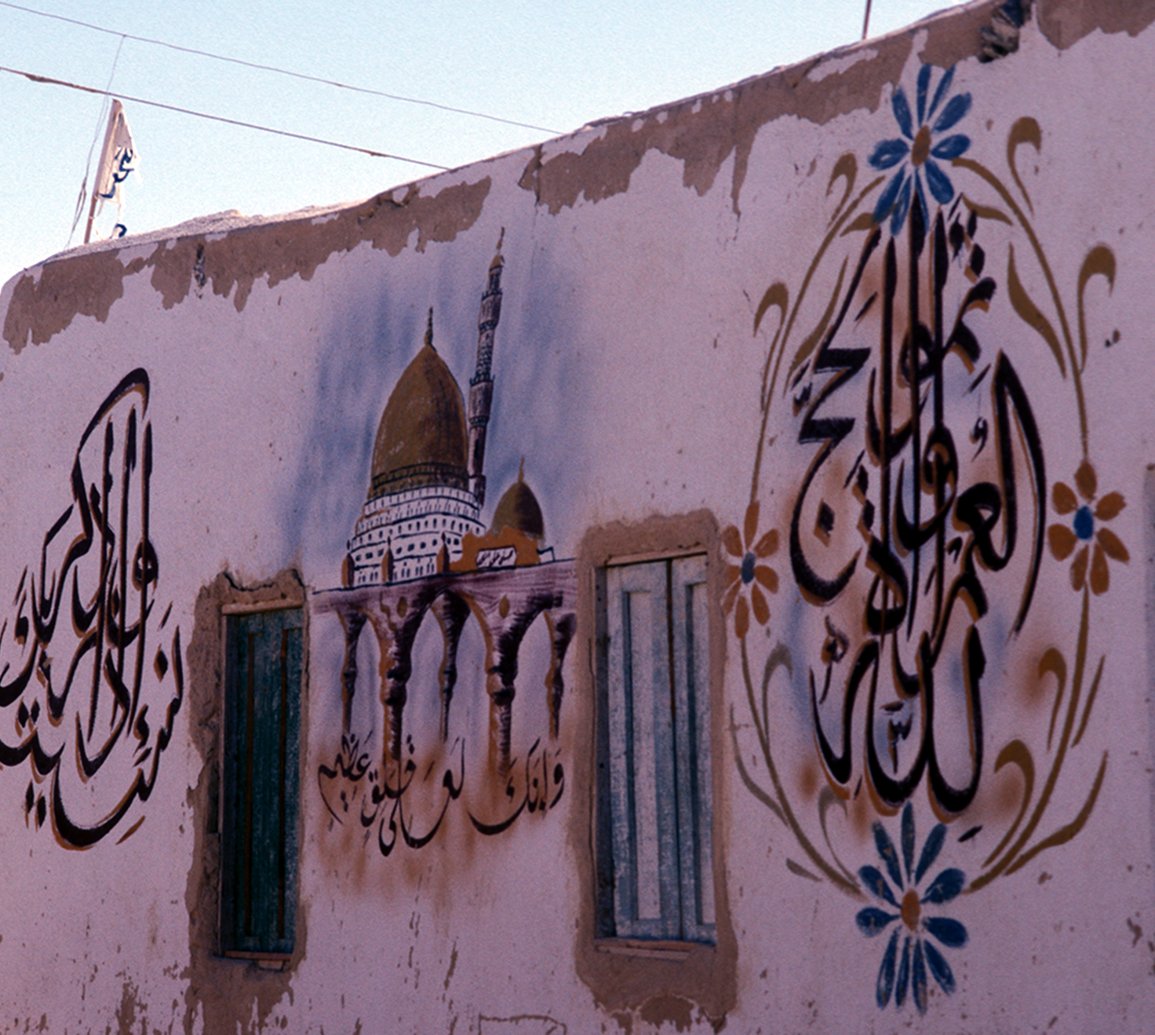
Pilgrim Ship
For a Muslim, going to Mecca fulfills the second of the five pillars of Islam and going during Ramadan, Islam’s holy month, doubles a Muslim’s chances for a front-row seat in the afterworld. My plan was to go by boat from the Suez Canal to the port of Suakin, Sudan on the Red Sea on a boat that was stopping at Jetta, only a few miles from Mecca. I had a deck class ticket with thirteen hundred pilgrims who were all going ashore at Jetta.
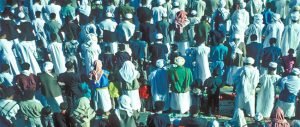
I knew I couldn’t get off at Jetta because I had no visa and wasn’t eligible for one. But one of my travel heroes, Sir Richard Francis Burton, made it to Mecca in disguise years before, dressed as a worshipper and riding on a donkey. I conjured up an idea to exchange passports with one of the fully-robed ladies who had just her eyes peeking out of a mesh so her identity was concealed.
Afraid to miss the early sailing, which my friend Kathi and I were told was 8:00 a.m., I was frequently awake during the night and permanently awake by 5:00 a.m. We arrived at the port shortly after without the effects of caffeine in our systems. I knew, since Ramadan was the month of daytime fasting, I’d not be able to purchase any at the dock.
Blowing their horns and inching their way toward the ship were trucks piled twenty feet high with parcels, baggage, orange plastic water bottles, prayer mats, carpets and food to be sold or used at Mecca. Every taxi in the Suez was crammed with turbaned men and veiled ladies, none wearing seat belts. Air-conditioned tour buses and windowless transport vehicles were equally as jammed as the trucks.
Proceeding faster than traffic, we were most conspicuous laden with big packs on our backs, daypacks on our fronts, plastic food bags in our hands and unveiled heads.
While waiting to pass customs we were directed from one side of the port to the other numerous times — back and forth, back and forth. The only logical reason would be that they thought we needed exercise. Eventually, men and women were placed in separate lines thus preventing an accidental encounter of the opposite sex, a definite no-no anytime and an absolute no-no-no during Ramadan. Sex is believed to spend energy that is better used for religious contemplation.
I noticed that, in their line-up the men were less anxious than the women to get moving. The rotund ladies were aggressive, pushing and shoving to get to the front of the queue. At one point, I would not permit a woman with saddlebag hips to shove in front of me. Her husband in the line-up beside us said, proudly and loudly in English, “Just a minute, just a minute,” while he waved his outstretched hands, palms down in a softening motion.
“Yes, just a minute for everyone!” I growled taking a football quarterback’s stance while staring down the woman beside me. The women, like children in school, eased up on their shoving.
The customs hall had non-functioning fans and grey cement walls that echoed the shrill excitement of the pilgrims. I chose the shortest line behind some men but was quickly ushered to a special foreigner’s wicket where there was no line up and the custom’s official spoke fluent English.
Once on the triple-decker ship, Kathi and I spotted a bench and some floor space near the bow of the middle level — a spot out of the sun and protected from wind. We spread our things on the bench and waited for departure. It was 11:00 a.m. and three hours past the scheduled hour.
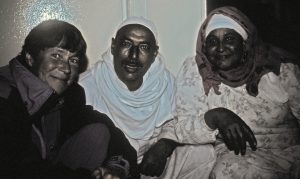
A wooden stairway beside our bench led to the lower deck where two rows of blue tin shower stalls sat across from half a dozen western-styled toilets tucked into cubicles so small I had to sit sideways to fit. The odour of urine, intermingled with engine oil, gagged me.
The boat filled with pilgrims — about 500 more than the ship was designed to hold. As the human flood slowed to a trickle, crew members told us we’d have to wait until the tide went out and the vessel sank enough for the gang plank to meet the dock so the heavy transport trucks could drive aboard and load the cargo.
Meanwhile, the pilgrims set up camp on all three decks, in the hallways and on the stairwells. Only by locking doors to work areas could the crew keep themselves safe. Walking without stepping on someone was a challenge.
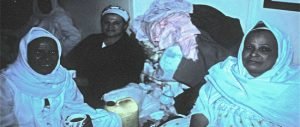
I noticed across from us three middle aged Egyptians building a blanket tent using benches and railings to secure three sides and a roof and with the entrance facing us. Their silk mats and embroidered pillows were placed on the floor inside.
The pilgrims all practiced the five daytime hours of prayer with the first being at sunrise and the last at sunset. During Ramadan, it was customary for those practicing the fasting requirement to sleep at sunrise and wake to party and eat at sunset. Since they were all busy getting settled on the ship, the daytime sleeping was omitted. As the sun dipped toward the horizon, I noticed pilgrims sitting with cigarettes gripped between their teeth, water glasses clutched in their hands and picnic baskets opened.
Kathi too was on the prowl, her nose keen on finding the familiar aroma of someone’s coffee or finding a plugin where she could make her own. When evening prayers commenced I could hear her whispering, “Coffee Allah, coffee!” but it seems that Allah didn’t have much sympathy for this infidel. She remained coffee-less until long after sunset.
While watching the crowds of heavily clad people mill around, I wondered if Muslims could disrobe in water or if they knew how to swim. I knew that in the event of an accident, the few lifeboats available could not hold all the people on board.
At midnight, the ship’s whistle blew a sharp blast that got the attention of all on board. Many stood at the railing and watched the boat glide along the golden road formed by the half-moon glittering on the dark water. It was nineteen hours since we had gotten up to catch the boat before it left without us.
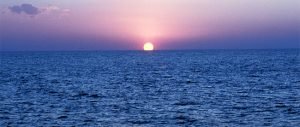
People then began eating the night’s second meal, which seemed to be the most festive and didn’t end until almost 2:00 am at which time the women started preparing the final meal. It was served at 4:00 am, just before sunrise and early morning prayers. Then they tucked in under blankets and slept.
By the end of the day, the “charity to travellers” pillar fell on me like the salt towers of Gomorrah. While Kathi tried to consume a day’s supply of coffee in one sitting, I restlessly walked from one end of the ship to the other, stepping over people who pulled at my arms and skirt, insisting I join them in a meal. I finally accepted some cabbage rolls stuffed with curried rice, chicken pieces painted in spicy sauces and picked carrots cut into geometric designs and thought that I must be helping the women get into paradise.
Finally, on the third day, the horizon’s solid line broke and revealed a glistening red stone pillar. Although too far away to see any town, a woman holding a child gripped my arm and pointed.
“Jetta,” she sighed. “Mecca,” she signed again.
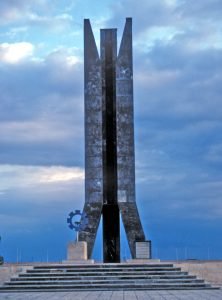
The hustle on the boat increased. Between prayers, women showered in the slimy tin stalls that had received a soap layer deposited by the pious preparing for prayers. Concealed from the men after showering, the women re-braided their hair and then hid the braids under white head-veils. They also concealed their female figures inside black, ankle-length overcoats, called chadors, which I imagined to be insufferably hot under the tropical sun.
The men wrapped white, seamless gauze sheets around their waists, skirt fashion and placed a second sheet, toga-style, over one shoulder. The sheets were held in place with safety pins. It was believed that the men were all equal in the eyes of Allah if they were dressed in such a fashion.
Everyone ran frantically up and down the stairs from one deck to the next, exchanging words or borrowing forgotten items. The ship pulled into port and the men, all robed in their white uniforms, paraded around the decks singing hymns and chanting prayers. They stopped occasionally, knelt, and touched their heads to the floor while facing the direction of Mecca.
The air was electric with anticipation and excitement. Kathi was electric with want of caffeine. Unable to convince anyone to exchange passports, I gave up my plan to sneak into Mecca. The hordes of people, bags clutched tightly, moved to the gangplank and then into Saudi Arabia. I watched them leave and thought that among all his other accomplishments, Muhammad was probably the first and greatest tour operator in history!
